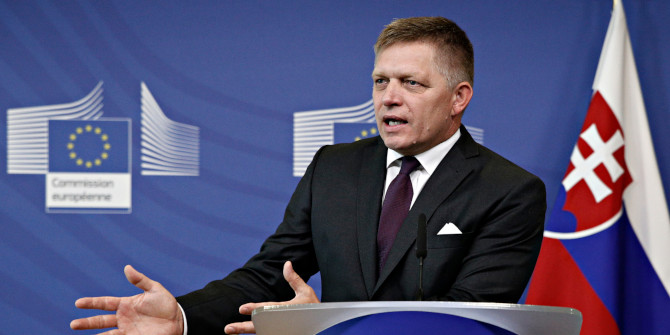 Clara Volintiru looks at the recent indictment of Romania’s former prime minister on corruption charges. Whilst it is undoubtedly positive to pursue justice for corrupt politicians, there is a dilemma in how to tackle corruption and other sources of institutional mistrust, when questionable and selective prosecutions may reinforce this distrust.
Clara Volintiru looks at the recent indictment of Romania’s former prime minister on corruption charges. Whilst it is undoubtedly positive to pursue justice for corrupt politicians, there is a dilemma in how to tackle corruption and other sources of institutional mistrust, when questionable and selective prosecutions may reinforce this distrust.
On the 20th of June, the international press enthusiastically announced a landmark prosecution of the ex-prime minister of Romania—Adrian Nastase, who was sentenced to serve 2 years in prison. After almost 8 years of trials, the verdict was anxiously awaited by his opponents and supporters alike, and by EU officials looking for improvements in Romania’s fight against corruption, as demanded under the EU’s Cooperation and Verification Mechanism (CVM) for Bulgaria and Romania. The chief prosecutor of the National Anticorruption Directorate, Daniel Morar claimed that it meant more than a Brussels target had been fulfilled; it established a judicial precedent for tough sanctions for high-level corruption.
In all appearance it looked like a step forward in Romania’s efforts to adopt better institutional practices, but the reality is much more ambivalent. Firstly, that Nastase attempted suicide in June touched an emotional cord with a nation that already experienced a bloody purge with the shootings of Nicolae Ceausescu and his wife in 1989. Secondly, while fervently contested by some for his patrimonialism, others enthusiastically support him given that the country experienced its most prolific economic period while he was prime minister. He is largely credited for Romania joining NATO and the EU. Thirdly, the well-known competition between him and the current president raises questions as to whether this amounts to political persecution rather than judicial prosecution. Finally, there were numerous flaws in the judicial process that have been brought to the attention of European Court of Human Rights by Mr. Nastase’s lawyers, further tainting the perceived legitimacy of the verdict.
In reality, there is no prejudice in this case as no actual misuse of state resources took place. Rather, it sanctions shady electoral campaign financing from private enterprises. While it is extremely important to start asking questions about how political campaigns are being financed in Romania, this instance doesn’t touch the core of the problem: the channelling of public funds for electoral purposes— which is a much more pervasive and damaging practice.
It may well be that this much hailed ruling is a Pyrrhic victory. The problems surrounding the prosecution process, the marginal nature of the accusations and the tragic development of events failed to achieve by far the much-needed sense of momentum in the fight against high-level corruption. On the other side, by compromising the second biggest figure of the political left, which is currently part of the ruling coalition, a new level of political and institutional distrust was reached in a country already highly mistrustful of its representatives. Additionally, this case ignited even further social divisions in a highly radicalized electorate, cementing a very damaging us-versus-them mentality.
According to the 2011-2012 Global Competitiveness report by the World Economic Forum, EU democracies; such as Italy, Greece, Bulgaria and Romania, score well bellow the world average in their public trust in politicians. While most of the EU has been swept by a powerful wave of political distrust, these South East European examples have in common very high perceptions of corruption, wasteful allocation, diversion of public resources, and favoritism in government decisions. As opposed to other member states, distrust in these political systems stems from a long process of growing disenchantment with the administrative system, a process that pre-dated the prolonged economic crisis.
Fueled by a considerable decrease in general welfare, political disillusion plagues most of Europe, allowing peripheral or upstart parties that offer unrealistic or impractical policies to perform remarkable well in recent elections. As damaging as this electoral volatility may be for the stability and cohesiveness of party systems across Europe, it is where informal linkages start to expand that the damage is most severe. The institutional distrust has electoral consequences. In some cases, voter-party relationships tend to be mediated by corruption and a parallel electoral system develops. This parallel system is firmly rooted in clientelistic linkages and preferential resource distribution rather than programmatic platforms. This ideologically detached political setting provides fertile ground for governing parties to expand even further their mechanisms of proprietary use of state resources.
Thus, in this general crisis of confidence, and looking at Romania’s recent efforts as a case study, an important question emerges: how can the sources of institutional distrust—corruption, wastefulness and political discredit, be tackled without further reinforcing institutional distrust? In the absence of a simple answer, caution has to be exerted, whilst and striving for the public’s perception of legitimacy and propriety of all governing actions. Questionable and selective prosecutions leave a clientelistic system largely untouched, but add an element of fear and uncertainty that further deepens the population’s mistrust of its representatives and public institutions.
Please read our comments policy before commenting.
Note: This article gives the views of the author, and not the position of EUROPP – European Politics and Policy, nor of the London School of Economics.
Shortened URL for this post: http://bit.ly/KVIEu6
_______________________________
 Clara Volintiru – LSE Government
Clara Volintiru – LSE Government
Clara Volintiru is a PhD candidate in the Government Department at the London School of Economics and Political Science (LSE). She holds an MSc in Comparative Politics, also from the LSE, an MBA from CNAM, and an undergraduate degree in economics. Her thesis is focused on political parties in new democracies, but her research activity has also covered topics from the wider area of political economy as well as conflict studies.





3 Comments